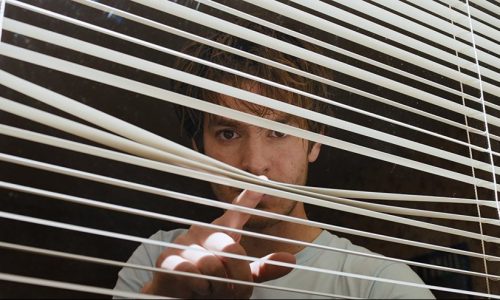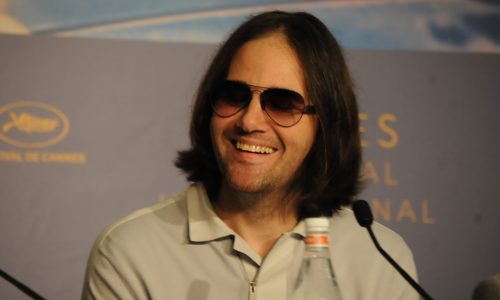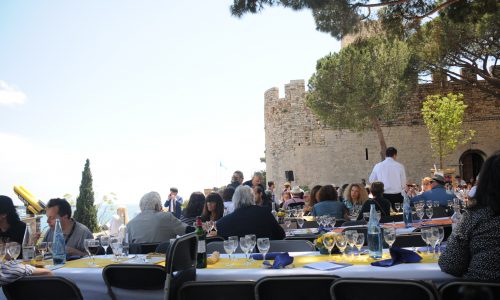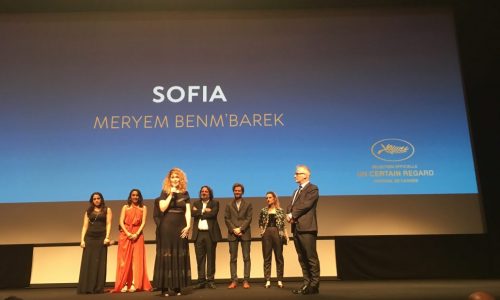
It was my last day in Cannes, so for once, I had to make sure I was up for the 8.30am screening. Sadly – as you might expect from Cannes – David Robert Mitchell’s Under the Silver Lake was not an 8.30am film. Andrew Garfield stars as a guy who’s just lost his job and is on the verge of losing his LA apartment when he gets involved with a girl who disappears and then apparently turns up dead, alongside a missing billionaire businessman. Borrowing heavily from the surrealistic style of David Lynch with an openly acknowledged nod to Hitchcock, Mitchell delivers an intriguing and complex but not altogether convincing noir-tinged study of the sub-culture of LA’s Silver Lake district.

Almost having no idea what to make of what I’d just seen, I was relieved that there was a press conference to follow, which would – I hoped – help to explain what of what I’d just spent the past two hours watching. Sadly, as press conferences go, it was among the least illuminating I’d ever been to, and Mitchell wanted it that way. With none of the actors on the panel – unusual for Cannes – we had three producers, the cinematographer and the composer sitting alongside the writer-director. With music being a key part of the film’s narrative, as Garfield seeks clues to the mystery in the lyrics of songs, and with a Hitchcock-esque score framing much of the action, it was untypically pertinent to hear from the interestingly named Disasterpeace, but other than that, the cheerful director repeated – to almost every question – that he didn’t want to explain what the film was about as he didn’t want to give anything away. He did reveal that he wrote the script quickly, after “an intense amount of coffee” after walking down a street and wondering what was going on inside the houses. Set in the summer of 2011, for no particular reason – except maybe that that’s when he wrote it and it took the huge success of 2014’s It Follows to enable him to make it – he says it’s a “dark and distorted fantasy of a particular moment in time. “He described it as a “fever dream” and on that, we’re agreed.

After that, it was time for my last lunch of Cannes, happily courtesy of the city’s Mayor. Every year, the Mayor’s office puts on a dinner for the hundreds of journalists who come to town. The invite says the jury of the main Cannes Film Festival will be in attendance. I had visions of a cosy lunch with Cate Blanchett, but that wasn’t quite how it happened. There’s a castle on a hill overlooking the Palais, with a vast courtyard outside. The courtyard was choc-a-bloc with long tables, with hardly room to squeeze between them. Local fare – from fish and vegetables to tart-tatin – were served from a long buffet as journalists searched for empty seats, with no guarantee that people sitting nearby would even speak the same language. Fortuitously, out of a sea of faces, a British colleague happened to spot me so at least we could enjoy the food and scenery together. When I asked where the Mayor and the Palme d’Or jury were, he pointed out that they were eating inside the castle. So it wasn’t so much lunch WITH the Mayor (and jury) but lunch COURTESY OF the Mayor, but I’ll take what I can get. On our way out, we even got a goodbye gift – some locally produced olive oil in a stylish glass bottle.
With a few hours before getting the bus back to the airport, as well as catching up with colleagues from around the world to say goodbye for another year, I thought I ought to at least try to see one more film. I had a choice of two, both screening in the Un Certain Regard strand – a Chinese one and a Moroccan one. For no particular reason, except that it was starting earlier and I’ve seen more Chinese films to have a better idea what to expect, I went for that one and climbed up to the third-floor Bazin cinema in the Palais. Proudly walking past the yellow-badged press, waving my blue badge at the security, I was stopped at the barrier as the screen was close to capacity. When the guard noticed my badge, he let me through, but another security guard, closer to the door, pushed me back, saying it was full. As I was remonstrating with him, a third security guard took five more people – not press – from the front of the queue. I ran after them, pointing out that I was meant to be the next person in. There were five more seats and I was now the sixth person in the line, I was told. I wasn’t – I was first. It was another example of the hugely disorganised queuing system at Cannes. One guard doesn’t know what the others are doing, leading to constant chaos and furious festival-goers, but there comes a point where there’s no point arguing – not least when I wasn’t particularly desperate to see that film and there was another option.
So it was off to the Debussy theatre for what would at least be a premiere, with the director and cast there to introduce the film. But, in time-honoured fashion, the security to get into the two main cinemas was monstrous. Once again, they tried to steal first my deodorant and then the olive oil I’d been gifted by their own mayor, just half an hour earlier. Then, as if to make it even more surreal, they said I could check my bag in to the cloakroom – quite why this option isn’t always offered in such circumstances, rather than stealing and binning whatever that particular security guard takes against, I don’t know. But on this occasion, they said they could put the olive oil back in the bag to go to the cloakroom, but the deodorant would have to be thrown away. It’s one thing for them to say that you can’t take deodorant into the cinema, but to say you can’t even leave it in the cloakroom is bizarre. Again, I protested that it was the only deodorant I had in the whole of France and they made an exception and agreed to allow it into the cloakroom, with a warning not to bring it again tomorrow. “Don’t worry,” I assured them. “I’ll be taking my deodorant back to the UK this evening.”

Once I was eventually inside, my final festival film would be the low-key Moroccan drama, Sofia. The director Meryem Benm’Barek and her cast introduced the film about a working class Moroccan teenager who’s managed to hide her pregnancy until the very last minute. But in a country where sex out of wedlock is a criminal offence, when the baby arrives, her relatives do all it can to keep her out of prison while protecting her family’s honour. Some are more supportive than others and the situation is complicated by the fact that her middle-class French-speaking uncle’s export business is about to do a big deal with a French company. The film provides an interesting insight into a culture where people with a higher status in life not only have nicer homes, but speak French rather than Arabic and have the money and connections to protect their families in a way that the often bitter people with lower status could never dream of. The eponymous protagonist is rather glum throughout; given the situation she’s in, it’s not surprising – but it does make it tough to feel too sorry for her. In fact a twist in the story leaves you sympathising more with an unexpected character.
Having been in Cannes in time to see the opening film, for the first time in my career, I was leaving for home earlier in the festival, with longer to wait for the Palme d’Or winner. It’s been an oddly subdued festival with generally shorter queues, lower profile films and fewer publicity stunts but plenty of the usual politics and controversy – not least over the security, whether they were clamping down on red-carpet selfies, shortbread biscuits or deodorant.
